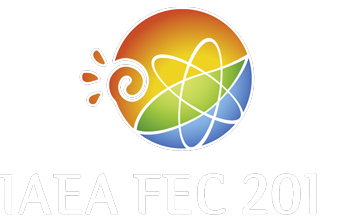Speaker
Dr
Yang Ren
(Princeton Plasma Physics Laboratory)
Description
Plasma turbulence is considered one of the main mechanisms for driving anomalous thermal transport in magnetic confinement fusion devices. Based on first-principle model, gradient-driven gyrokinetic simulations have often been used to explain turbulence-driven transport in present fusion devices, and in fact, many present predictive codes are based on the assumption that turbulence is gradient-driven. However, using the electrostatic global particle-in-cell Gyrokinetic Tokamak Simulation (GTS) code [1], we will show that while global gradient-driven gyrokinetic simulations provide decent agreement in ion thermal transport with a set of NBI-heated NSTX H-mode plasmas, they are not able to explain observed electron thermal transport variation in a set of RF-heated L-mode plasmas, where a factor of 2 decrease in electron heat flux is observed after the cessation of RF heating. Thus, identifying the regime of validity of the gradient-driven assumption is essential for first-principle gyrokinetic simulation. This understanding will help us more confidently predict the confinement performance of ITER and future magnetic confinement devices. The work is supported by DOE and computational resource is provided by NERSC.
[1] W.X. Wang et al., Phys. Plasmas 17, 072511 (2010)
| Country or International Organization | USA |
|---|---|
| Paper Number | EX/P4-35 |
Author
Dr
Yang Ren
(Princeton Plasma Physics Laboratory)
Co-authors
Dr
BENOIT LeBlanc
(PRINCETON PLASMA PHYSICS LABORATORY)
Dr
Calvin Domier
(UNIVERSITY OF CALIFORNIA AT DAVIS)
Dr
David Smith
(University of Wisconsin-Madison)
Dr
ERNESTO MAZZUCATO
(PRINCETON PLASMA PHYSICS LABORATORY)
Dr
Howard Yuh
(NOVA PHOTONICS, INC.)
Dr
RONALD Bell
(PRINCETON PLASMA PHYSICS LABORATORY)
Dr
Stanley Kaye
(Princeton Plasma Physics Laboratory, Princeton University, Princeton NJ, 08543 USA)
Dr
Stephane Ethier
(princeton plasma physics laboratory)
Dr
Walter Guttenfelder
(Princeton Plasma Physics Laboratory)
Dr
Weixing Wang Wang
(Princeton University Plasma Physics Laboratory)

